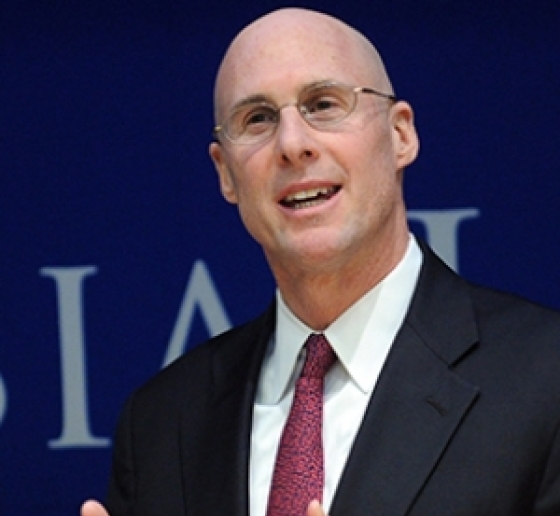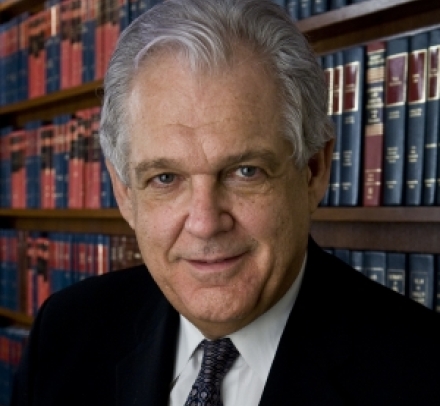Robert H. Smit ’86: Capping a Career With a Commitment to the Classroom
The international arbitration expert and longtime adjunct professor joins the Columbia Law School faculty full time.

Robert Smit ’86 earned a nickname among his colleagues at Simpson Thacher & Bartlett for his expertise in the legal theories underpinning the firm’s practice in international arbitration: “The Professor.” Now, as he joins the full-time faculty of Columbia Law School on July 1, his new title acknowledges his decades in Big Law: professor of professional practice.
Smit, who chaired Simpson Thacher’s international arbitration and dispute resolution practice for over a decade before retiring in 2016, works as an independent international arbitrator and has been an adjunct professor at Columbia Law since 2010. In his new faculty role, he is also director of the Law School’s Center for International Commercial & Investment Arbitration, where he hopes to grow the center’s role as “a useful think tank” for arbitral institutions located in other countries, as well as for foreign governments seeking to modernize their international arbitration regimes, and to make the center’s projects more “student-inspired.”
He currently teaches Advanced International Commercial Arbitration and Transnational Litigation. “They’re both fields that are about a procedural forum, as opposed to a substantive area of law,” Smit says, noting that procedural regimes reflect cultural differences between countries just as substantive law regimes do. Practicing as an arbitrator “allows you to see life and law through a different lens,” he says. “I emphasize the cultural clashes in the areas that I teach.” For example, “You cannot go into an international arbitration and be an overly aggressive, scorched-earth ‘ugly American’-type litigator. That would not play well.” Instead, Smit says, “You are generally more effective as a wolf in sheep’s clothing, and take into account your arbitrators’ cultural backgrounds and expectations.”
Columbia in His Blood
Smit’s commitment to teaching springs from the example of his parents, both of whom were academics. His father, Hans Smit ’58 (1927–2012)—the Dutch-born scholar of international law, conflict of laws, and international arbitration—was a towering presence at Columbia Law for more than 50 years.
After the elder Smit’s death, the family received scores of letters from former students attesting to his influence and encouragement, “saying how he had changed their lives and how grateful they were for him,” his son says. “The reasons I teach are to pay homage to my father’s legacy and, more importantly, hopefully to make a difference in Columbia Law students’ lives.”
Robert Smit grew up in Morningside Heights, a block away from Columbia’s gates. (“I used to sneak into the Columbia gym. Now I have an ID.”) The family spent summers in the Netherlands (where Hans Smit had founded the Columbia Summer Program in American Law in Leiden and Amsterdam in 1963) and spent the father’s sabbaticals in France, where Smit and his sister attended local schools. “If Columbia is in my blood, so is an international perspective,” Smit says.
After graduating from Columbia Law, he clerked for Judge Charles M. Metzner of the U.S. District Court for the Southern District of New York. He then earned a diploma in private international law and international commercial arbitration from Paris 1 Panthéon-Sorbonne University and spent three years trying civil and criminal cases in Geneva.
“I came to appreciate how the civil law system works and how civil law lawyers see American lawyers and our legal system. It has also become apparent to me how few common law lawyers—Americans—take the time to learn about and appreciate the rest of the world’s legal systems,” he says. “So my professional mission—developed from doing transnational litigation and international arbitration over the years—is to try to get Americans to learn about and appreciate foreign lawyers and legal systems, as well as foreign lawyers know and appreciate us and our legal system.”
Today, he regularly teaches LL.M. students, many of whom are lawyers from countries using the civil law system. “They are amazed and dumbfounded by how [common law] makes things so complicated. But they also appreciate that the U.S. case law system breeds good lawyers because they’ve had to struggle with a more difficult system.”
Working and Teaching in a Growing Field
Smit has worked in international arbitration at a time when the field has exploded in popularity. “We developed Simpson Thacher’s arbitration practice on the coattails of our clients saying, ‘Cases we used to litigate now have contracts with arbitration clauses in them. So we have to arbitrate them,’” he says. Given current trade upheavals, international arbitration will only continue to grow, in both number and value, he says. “There's going to be an inevitable boom in international arbitrations rising out of the U.S. imposition of tariffs, just as there was during the pandemic,” he says. “When there’s market disruption, there are market disputes. And when there are market disputes, there’s international arbitration.”
Smit is co-editor-in-chief of The American Review of International Arbitration (ARIA), has served on the International Chamber of Commerce (ICC) International Court of Arbitration, and was an adviser to the American Law Institute Restatement of the U.S. Law of International Commercial and Investor-State Arbitration. His published scholarship includes, most recently, an article on “Questionable Arbitrator Habits,” (ARIA, 2024), which examines widely accepted, but “questionable,” procedural habits of international arbitrators, such as the deferral of arbitrators’ questions for witnesses until after the parties’ arguments have concluded. (It cites, in a footnote, inspiration from comedian Larry David, “whose focus is on the curious details of life … often overlooked and unexamined, which may have outsize consequences.”) What’s useful about the article, he says, is that it comes from the point of view of a practitioner: “I'm writing about what arbitrators do behind confidential closed doors.”
In an essay included in “Pro-Arbitration” Revisited: A Tribute to Professor George Bermann From His Students Over the Years—a book honoring George A. Bermann ’75 LL.M., Walter Gellhorn Professor of Law and Jean Monnet Professor of European Union Law—Smit explores the rationale for the “pro-arbitration” policy in U.S. federal law. Another article, co-written for The American Review of International Arbitration, discusses the distinctions in witness cross-examination between U.S. proceedings and those conducted by lawyers in the United Kingdom, Singapore, and other English common law traditions.
“It’s the nitty-gritty of arbitration practice that interests me,” Smit says.
The Professors Smit
Many Columbia Law alumni have a Hans Smit story—Rob Smit does, too. He enrolled at the Law School after a brief career playing semipro basketball in southern France. (“I just wasn’t good enough,” says Smit, who is 6 feet, 3 inches tall but concedes that his team, Villefranche-de-Rouergue, usually spent halftime smoking cigarettes on the bench.)
As a 1L, he found himself in his father’s Conflict of Laws class, thanks to the Law School’s system at the time of dividing the student cohort alphabetically.
“He called on me seven times in the first class,” recalls Smit. He promptly switched to another professor’s section, and “I spent the rest of the three years at Columbia basically in hiding.”
When he began teaching at Columbia himself, Smit developed his own classroom style, reflecting his years as a practitioner.
“I don’t throw hard candy like Dutch Hopjes at my students the way my father did,” he says. “What I do is I share my experiences in practice, in international arbitration, and I think those are the lessons that resonate with them.” He keeps in touch with many of his students. Some have reached out to Smit after graduation to let him know that he inspired them in their career paths; several have followed his example of clerking for the ICC International Court of Arbitration. Others have appeared before him as counsel in cases where he serves as arbitrator. “That’s always rewarding to hear and see,” he says.
Hans Smit, in the latter half of his career, also became a leading expert in international arbitration as the field developed. “He started serving as an arbitrator in roughly the same decade that I started serving as counsel in international arbitrations,” his son says. As a result, the two Smits began conferring, albeit with a far different dynamic than they had in that 1L classroom.
“He was not an easy guy to grow up with,” Smit says of his father. “But, you know, when I became a partner at Simpson Thacher, things kind of shifted. He was asking me for my advice as much as I was asking him for his.”
